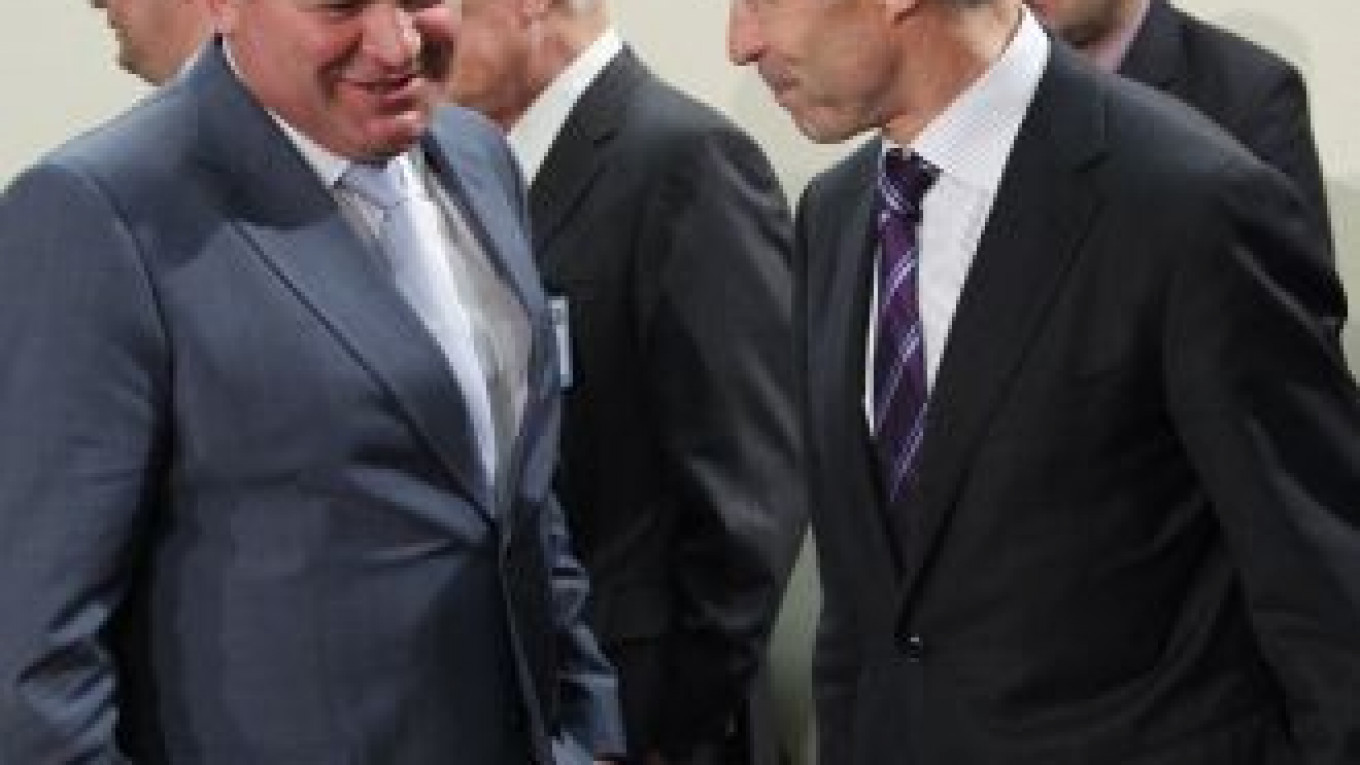BRUSSELS — NATO and Russia clashed again over the alliance's plan to build a missile defense system, but NATO's leader said he was optimistic that the two sides could iron out their differences in time for a summit next May.
NATO Secretary-General Anders Fogh Rasmussen said the military alliance and Russia "are coming closer to reaching agreement" on principles for cooperating by creating two separate missile defense systems — one NATO and one Russian — that could exchange information.
But Defense Minister Anatoly Serdyukov told Interfax that the idea of linked Russian and NATO missile shields "doesn't suit us" and could spark a new arms race.
The United States says the shield would fend off Iranian missile threats and isn't aimed against Russia, but Moscow wants legal guarantees on that.
Russia sees the U.S.-led missile defense plans as a potential threat to its security. It agreed to consider NATO's proposal last fall to cooperate on the missile shield, but insisted that the system be run jointly. NATO rejected that demand and no compromise has been found yet.
Serdyukov said the NATO system would "neutralize Russia's strategic capabilities," Itar-Tass reported.
Fogh Rasmussen and Serdyukov spoke separately after their meeting Wednesday.
Fogh Rasmussen urged Russia to "engage in positive cooperation with NATO and focus on real security challenges instead of some ghosts of the past that do not exist any longer."
"It will be hard work, but I am still optimistic — I think at the end of the day we can reach a solution," he said.
Despite his warnings, Serdyukov said the talks would continue.
"We haven't yet tried every possibility with NATO," Serdyukov said.
"There should be ways that meet the demands of Russia and the other side," he said. "There is simply no other way otherwise we could find ourselves back in the times that we were developing the arms race."
Azerbaijan wants Moscow to pay more for the use of a radar station that is part of Russia's warning system against attacks from beyond its southern frontiers, Azeri Deputy Foreign Minister Araz Azimov told Reuters.
Russia operates the Qabala radar station under a 10-year agreement with Azerbaijan, which stands on the Caspian Sea between Russia and Iran. It expires in August 2012.
"The Russians want us to extend the lease. We are ready to consider cooperation, but the conditions should be reviewed," Azimov said.
When asked what exactly should be changed in the agreement, Azimov said, "They should pay more." Russia is now paying $10 million per year.
"The risk is bigger, the issue is more prominent, and the importance of Qabala has increased," Azimov said.
He did not say how much Azerbaijan wants Russia to pay or explain the risk.
A Message from The Moscow Times:
Dear readers,
We are facing unprecedented challenges. Russia's Prosecutor General's Office has designated The Moscow Times as an "undesirable" organization, criminalizing our work and putting our staff at risk of prosecution. This follows our earlier unjust labeling as a "foreign agent."
These actions are direct attempts to silence independent journalism in Russia. The authorities claim our work "discredits the decisions of the Russian leadership." We see things differently: we strive to provide accurate, unbiased reporting on Russia.
We, the journalists of The Moscow Times, refuse to be silenced. But to continue our work, we need your help.
Your support, no matter how small, makes a world of difference. If you can, please support us monthly starting from just $2. It's quick to set up, and every contribution makes a significant impact.
By supporting The Moscow Times, you're defending open, independent journalism in the face of repression. Thank you for standing with us.
Remind me later.






